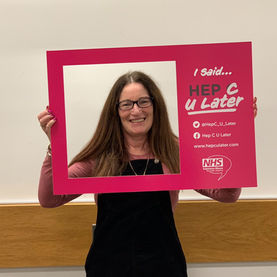
who is hep c u later?
Hep C U Later is a small team of people making a big difference in their mission to eliminate hepatitis C. There are two strands to Hep C U Later, focusing on different areas but united in their ambition to eliminate hepatitis C by 2030.
If left untreated, the Hepatitis C virus can cause serious and potentially life-threatening damage to the liver and may also have adverse effects on the digestive system, lymphatic system, immune system and brain.
Building on the local Hepatitis C elimination programmes our members have piloted in their individual services, we are thrilled to be working with NHS England and Gilead on this innovative partnership project which will ensure that people affected by Hep C are tested, treated and cured quickly and in line with evidenced best practice.


what do
they do?
Hep C U Later currently have two distinct programmes. Both programmes have accomplished remarkable work by uniting various organisations across diverse sectors:
-
Programme 1 - The first programme focuses on community drug and alcohol services and began in January 2020. It is an initiative of the NHS Addictions Provider Alliance (NHS APA). The programme aims to micro-eliminate hepatitis C within the drug and alcohol services of the NHSAPA. This initiative, commissioned by the NHS England Hepatitis C Elimination Programme, has done incredible work to help 27 services reach hepatitis C micro-elimination.
-
Programme 2 - The second programme targets health and social care services such as general practice, pharmacies, dental practices and universities, and it is commissioned by NHS England. Its goal is to engage professionals to empower them to support the elimination of hepatitis C by providing resources, awareness, training, and communication among professionals.
“This highlights how NHS Trusts collaborating and working in partnership with organisations from other sectors can amplify the impact NHS services can have on the health and wellbeing of the people it treats and supports to improve their lives”.
- Candie Lincoln, Project Manager
key successes
of the
programme
-
41,867 hepatitis C tests across the NHS APA since 2020
-
1,722 resources downloaded in 2024
-
Thousands of printed resources distributed to hundreds of services
-
Hundreds of professionals completed Hep C U Later CPD-accredited training
-
27 NHS APA services reached hepatitis C micro-elimination
-
Since its introduction 1,481 people have accessed the NHSE hepatitis C testing portal through the Hep C U Later resources and website
-
The NHS APA have increased testing every year of the Hep C U Later Programme
key resources and training
Hep C U Later have assembled various resources to help teams reach more people at risk of hepatitis C and to raise hepatitis C awareness. View them here.
Some key resources:
Hep C U Later have also created free online CPD-accredited training modules which can be completed for free online in around 60 minutes. This is an excellent resource for gaining comprehensive knowledge of hepatitis C.
Access the training here.
the team
Hep C U Later is a small but diverse team with extensive personal and professional experience in eliminating hepatitis C. Across the two programmes, the team comprises healthcare, communications, managerial, and data professionals:
-
Deanne Burch, Programme Lead
-
Candie Lincoln, Project Manager
-
Louise Hansford, Hepatitis C Elimination Coordinator (South/London)
-
Laura Hughes, Hepatitis C Elimination Coordinator (Midlands/North)
-
Edward Taylor, Engagement and Communications Officer
-
Robert Fair, Data Analyst
-
Chris Hughes, Data Analyst
-
Tony Mullaney, High Intensity Engagement Coordinator
how hep c u later works
Hep C U Later's primary objective is to support the elimination of hepatitis C in England.
Hep C U Later work nationally to support NHS APA community drug and alcohol services to micro-eliminate hepatitis C through enhancing knowledge and understanding of hepatitis C, outreach, pathway improvement, providing guidance, supporting with testing.
A critical element of support is through providing a deep dive into a service's data to help them gain a greater understanding of who they have left to test and providing a data dashboard to easily present this data all in one place.
The team uses their expertise and experience to assist with testing and treatment events. They have contributed to innovative initiatives, such as clinical outreach vans and pilot projects, aimed at identifying individuals who require testing and treatment which otherwise may never have received it.
Hep C U Later have been highly successful in offering bespoke training sessions, webinars, and practitioner’s forums to help teams gain a deeper understanding of hepatitis C. By utilising past case studies and experiences, they have effectively demonstrated the best practices for micro-eliminating hepatitis C within services.
The team also utilises effective communications and marketing strategies to help spread their message across social media platforms, as well producing and providing resources to support staff and people accessing services.
Hep C U Later have communications and marketing expertise, allowing them to reach new audiences and professionals. Through delivering exhibitions at major conferences, conference abstracts, reaching other organisations who share key content they have achieved a significant reach of professionals.
the NHS England programme
Key successes of the NHS England programme are as follows:
-
The number of people living with hepatitis C has fallen dramatically
-
37% reduction in deaths from hepatitis C
-
52% reduction in the number of liver transplants
-
102% increase in hepatitis C testing in drug services
-
140% increase in the number of people accessing treatment – 74,000 people treated
-
In 2021/2022 – 50% of hepatitis C treatments were given to the most deprived 30% of the population and 80% of hepatitis C treatments were given to the most deprived 50% of the population




















